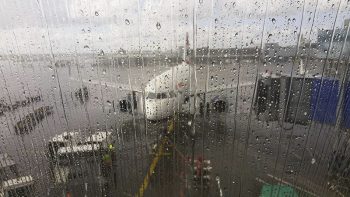 The federal government’s updated Regulations Amending the Air Passenger Protection Regulations take effect 08SEP, and Ottawa is under fire from both sides of this hot button topic.
The federal government’s updated Regulations Amending the Air Passenger Protection Regulations take effect 08SEP, and Ottawa is under fire from both sides of this hot button topic.
Both the airlines, who will have to compensate customers regardless of whether a delay or cancellation is within their control, as well as consumer advocates, who say the new regulations don’t go far enough, are protesting the new regulations.
The Canadian Transport Agency’s (CTA’s) amended rules were announced 22JUN by Canada's Minister of Transport, Omar Alghabra - following pandemic air refund consumer concerns and growing air travel chaos this summer - to "ensure Canadians' interests are protected when they travel by air."
The new rules will apply to all flights to, from and within Canada, including connecting flights, beginning Thursday, 08SEP.
Winds of Change
Until now, the Air Passenger Protection Regulations required refunds to be provided for flight disruptions within the control of airlines.
The new requirements will require airlines to provide passengers with either a refund or rebooking, at the passenger's choice, when there is a flight cancellation, or a lengthy delay, even due to a situation outside the airline's control.
That includes not only issues like weather, but also labour shortages. That has been a growing point of contention between airlines and pax during the pandemic and air travel’s restart.
In fact, as Open Jaw has reported, as recently as 10AUG, WestJet filed a motion with the Federal Court of Appeal in Vancouver, arguing it shouldn’t have to compensate a passenger for a flight in 2021 that was cancelled last minute due to lack of staff. The airline claims the crew shortage was a safety issue and therefore exempt from compensation rules.
Under the new regulations, it appears airlines will no longer be able to make those claims.
Closing Loopholes
"These new requirements provide clarity around timing, cost coverage, method of payment, and deadlines to refund travellers in such situations.
“They were developed in a manner that is fair and reasonable to passengers, with the goal of not imposing an undue financial burden on air carriers that could result in higher travel costs,” said Alghabra in JUN when the new rules were announced.
"Our government will continue to protect the interests of passengers."
The new regulatory requirements:
- Require airlines to provide a passenger affected by a cancellation or a lengthy delay due to a situation outside the airline's control with a confirmed reservation on the next available flight that is operated by them or a partner airline, leaving within 48 hours of the departure time indicated on the passenger's original ticket. If the airline cannot provide a confirmed reservation within this 48-hour period, it will be required to provide, at the passenger's choice, a refund or rebooking;
- Identify what costs must be refunded (unused portion of the ticket, which includes any unused add-on services paid for);
- Identify the method to be used for refunds (same as the original payment, e.g., a return on the person's credit card);
- Require airlines to provide a refund within 30 days.
“A Win” for Passengers?
Tom Oommen, director general of the analysis and outreach branch at the CTA, told CBCNews the new regulations are a milestone in air traveller protection.
"It's a big deal. It's a win for passengers,” he said.
But not all consumer advocates agree. CBCNews spoke with Sylvie De Bellefeuille, a lawyer with the Quebec-based advocacy group Option Consommateurs. She says the 48-hour grace period allowed by the new rules for airlines to get pax on a flight is no help to someone travelling for a short period of time to an event. According to De Bellefeuille, the traveller could miss the event completely and be already due to return from their trip by the time they get an outbound flight.
"If [the flight] is for a specific event and … you cannot attend, then the flight becomes useless " she pointed out. And, under the new rules, an airline would not be required to provide compensation.
An air pax rights expert and spokesperson for the CAA says the updated regulations are a “slight improvement.” But Ian Jack also says that rules without enforcement are meaningless, and the CTA needs to do better getting compensation to pax who have filed claims against airlines, pointing out the CTA’s huge backlog in disputed claims processing.
New Regulations Don’t Fly: Airlines
According to Ottawa, airlines were consulted during the formulation of the new rules. Nonetheless, they’re calling them “unfair.”
The president of the National Airlines Council of Canada (NACC), Jeff Morrison, says the new rules put all the responsibility on the airlines when other entities, like security screeners, customs, or airport operations are at least partly to blame for flight delays and cancellations.
"None of those [entities] will have any responsibility in the event of a disruption," Morrison told CBCNews. "These new regulations put it all on the backs of airlines."
Canada’s airlines say that at the very least, they want service standards for security, customs and airports to be put in place alongside the new regulations that, beginning 08SEP, leave airlines holding the bag on performance.






